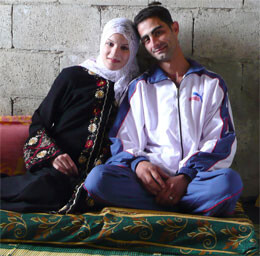Nahr al-Bared refugee camp 15 January 2008

Ahmed and Liliane Hassan lost their home and wedding dowry to the conflict in Nahr al-Bared, but have returned to the camp and were at last married. (Lucy Fielder/IRIN)
They were among several thousand Palestinians allowed to return from 10 October, and soon after tied the knot. Ahmed explained:
“When we celebrated our engagement during the 2006 July War, the Israelis bombed Abdeh, on the edge of Nahr al-Bared and we ended up in the shelters. Then the fighting delayed our wedding.
“My parents had planned a three-day traditional feast because I’m their first son to marry. Now we have nothing, only a few small pots we were given, and there’s no money for food. So we had a quick, basic ceremony.
“I nearly didn’t make it to my own wedding. At the checkpoint in the morning I realized I’d left my entry permit at home. One soldier kicked up a fuss, but a nicer one waved us through into Nahr al-Bared. Whether they harass you depends on their mood.
“The dowry in gold was stolen. Friends who stayed on in the old camp during the battle told us the army was looting our stuff. A few days later, our building lay in ruins.
“We had built a flat over my parents’ place and got it furnished and ready to move into after the wedding. But it has all gone. Like most people, we had to flee in what we were wearing.
“My parents and 10 of my brothers and sisters cram into two rooms of our rented flat so Liliane and I can have the third. We have electricity and water for an hour or two a day. It’s cold at night: we have four blankets between us and the children have no pyjamas or warm clothes. The army reduced us to nothing.
“But the most important thing to us is that we’re married and we’ve returned to the camp. It felt like a kind of resistance, to celebrate and dance despite everything we’ve suffered.”
This item comes to you via IRIN, a UN humanitarian news and information service, but may not necessarily reflect the views of the United Nations or its agencies. All IRIN material may be reposted or reprinted free-of-charge; refer to the copyright page for conditions of use. IRIN is a project of the UN Office for the Coordination of Humanitarian Affairs.
Related Links



